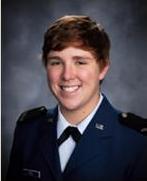 |
Into
the Sky Without Limits
USAF Academy Cadets
Lydia Hill and Brandon Reams
By Denny Meyer |
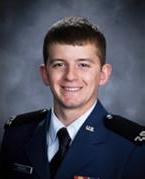 |
There will come a day when gay
associations at military academies and bases are as
normal and routine a part of of the military life milieu
as some would have us believe they already are.
With our freedom to serve in pride just over a year old,
however, such groups and their founding leaders are
pioneering the way forward and creating history with
every seemingly routine thing that they do. Simply
serving our nation openly as gay men and women was
unthinkable just a few years ago. Those
volunteering to serve today, do so for the same
patriotic reasons that we always have. Who we
happened to be has always been less important that what
we wanted to become. Being black, or gay, or
Hispanic, or female, or Jewish, for example, has always
been secondary to volunteers who chose to be American
patriots serving our nation.
When I left college to volunteer
45 years ago, a recruiter offered me the option of
training to become an officer. I declined, at the
time, because I could not imagine a gay man being
allowed to lead or even getting away with doing so
secretly. Over the course of a decade of proud
service, I nevertheless grew into leadership and left as
a Sergeant First Class. And yet, I ended my
successful military career at midpoint, out of fear that
it could all come crashing down suddenly simply because
someone might discover that I'm gay.
In December, I had the pleasure
and honor of interviewing two out proud patriotic U.S.
Air Force Academy Cadets, training to become tomorrow's
leaders, who no longer have to have the slightest
concern that who they happen to be could have any
relevance to their becoming officers leading airmen in
defense of our nation's freedom.
Lydia Hill and Brandon Reams are
Cadets 3rd Class, sophomores, in the Air Force Academy's
class of 2015, and are cofounding leaders of Spectrum,
the official gay and lesbian on campus club.
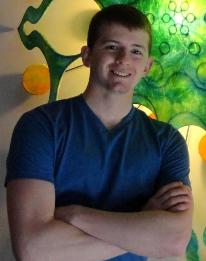 |
Brandon Reams, aged 21, was
perhaps inspired by his uncle who served as an enlisted
man in the Air Force. He grew up wanting to fly.
Coming from rural small town America, he saw the
educational resources of the Air Force as a way to
enable his goal of working in cyber development.
Despite knowing that he was gay since he was a teenager;
he never thought that it would have any impact on his
aspirations. Despite being aware of homophobia and
racism in high school, he never imagined letting any of
that stand in his way forward. He was born at the
dawn of the Don't Ask Don't Tell era of official
discrimination, and knew it would come to an end.
As the history of freedom's progress in our armed forces
unfolded, he has been able to be more out at the academy
that he had been at home. |
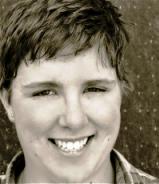 |
Lydia Hill, aged 19, is from
Boston. Her military inspiration may have been her
grandfather who served in Korea. She had always
wanted to serve. Her background and experience in
the sport of fencing, as well as her academic
excellence, led to an Air Force Academy recruitment
offer that opened the door to her future. As was
Brandon's experience, she found the Academy to be a
place of military professionalism and acceptance where
she was able to be free to realize her full potential
both as an individual and as a future leader. |
For both Brandon and Lydia, the
military's transition to open service took place a few
months after they had arrived at the Academy.
Hence, as freshmen cadets, they had no time to even
think about what that meant for them. And yet, she
and Brandon found that a great weight had been lifted in
that they no longer needed to lie about what the did on
weekends and with whom. They discovered that they
had the security of being able to choose to tell
friends who they are. Telling peers turned out to
have its own rewards; their peers asked questions and
were accepting. The development of that kind of
camaraderie is a huge part of what leadership training
is all about.
What is it like to be open at the
Academy? They have equality stickers on their
computers; their e mail tags say, "Co President of
Spectrum." And when fellow cadets talk about
weekends, they now remember to recognize and take into
account Lydia's and Brandon's identity and
relationships, rather than assuming that everyone is
straight. Thus, they noted, simply being open
about who they are at the Academy has made others more
aware and accepting. That kind of progress, for
them, is what gives meaning to their pioneering risk
taking.
When I asked them about their
future expectations, as founders of the first lesbian
and gay group at the Academy, Brandon was pragmatic.
First, he expects to graduate, be commissioned and
become a 2nd Lieutenant. As an openly gay officer,
he wants to be able to "keep the ball rolling," to set
an example. He believes that the Air Force Academy
is on the cutting edge of equal rights; and so he will
be able to feel comfortable about his airmen knowing who
he is. (It should be no different than if he were
Hispanic or Black).
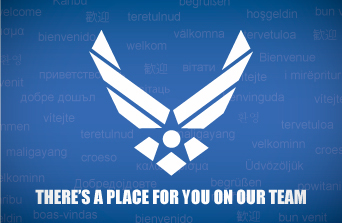
For Lydia, the main purpose of
what they are doing is that Spectrum breaks down
people's ideas of what or who a gay person is; it is
educating their peers and future officers that they are
no different from any other cadet and future leader.
They are making themselves available via Spectrum, she
said, so that their fellow cadets will know the right
thing to do when leading their airmen as officers; so
that as leaders they will be able to empathize with
those of their airmen who are gay.
While there is not currently any
formal training component regarding "how to be an
officer who happens to be gay," Brandon and Lydia are
pioneering in providing "safe space training" which is
open to all cadets. They provide information on
gay culture and lead open discussions. The very
existence of Spectrum at the Academy enables all cadets
to understand, respect, and relate to their peers and
the airmen they will lead.
Lydia and Brandon realize that not
all gay cadets choose to be out. They made the
choice to do so, they said, both to enable themselves to
be better leaders, and to set an example by being proud
of who they are, without shame; thus creating an
environment where others may feel safe in being out as
well. Individuals choose the time that is right
for them to come out; when they are ready, Spectrum will
be there for them, according to Brandon. Lydia
added that she and Brandon have chosen to be the first,
exemplifying that they can be out and proud carrying on
without any problems from peers or command. "We
are here to stay," she said.
Most people would not choose to be
a 'poster kid' as the first out gay cadet, Brandon
noted. But, "we are just who we are. To
lead, you have to know yourself, and embrace who you
are; if you are still struggling with that, it's much
harder to lead others."
Spectrum was honored and thanked
by Blue Alliance (the organization of LGBT Air Force
Academy graduates), at its dinner earlier this year,
for being the first out organization at the Academy and
thus representing all those who came before and paving
the way for those who will follow in the future.
All this old gay sergeant
can say is, OUTSTANDING!
© 2013 Gay Military Signal